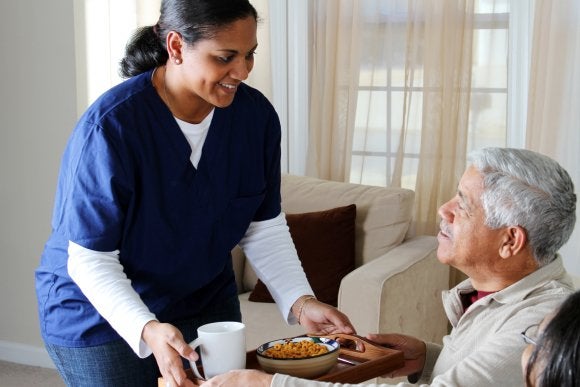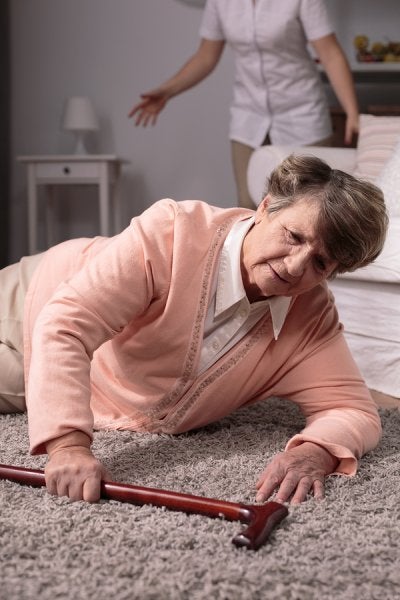-
Answering Questions Families Have About End-of-Life Care
If your loved-one has been diagnosed with a terminal illness, there may come a point at which you have to make the difficult decision to end his or her medical treatment. If he or she is suffering and there is no prospect of recovery, the time may come to end all medical interventions except palliative treatment, and seek end-of-life care in Memphis . At this point, the priority is to make sure that your loved-one spends his or her last days and weeks with as much dignity as possible.

Treatments and Therapies
There are number of medical and psychological treatments available to help make your loved-on comfortable during the final period of his or her life. Trained professionals can prescribe and administer pain medication. The loved-one may also need medications to alleviate other symptoms, such as nausea, digestive problems, or difficulty breathing. Treatments may be administered at home or in a hospital, depending on his or her needs and wishes. Spiritual and psychological support is also crucial. Counselors, together with spiritual leaders, if appropriate, and other skilled professionals can offer guidance and emotional support.
Advanced Directives
Most patients find it reassuring to talk about their wishes for end-of-life care well in advance. This allows them to make decisions calmly, while they are still in relatively good health and can think clearly. Their primary care physicians should discuss the available options clearly and frankly. Knowing that they have already made all the necessary arrangements offers many patients peace of mind. The loved-on can draw up an advanced care directive , designating a proxy decision-maker, and detailing his or her specific wishes with regard to care. This enables friends and relatives to know exactly what to do later, even if the patient is too incapacitated to be able to express his or her own needs or desires.
Emotional Support
If you are caring for someone in the final stages of a terminal illness, there are a few simple things you can do to help him or her come to terms with the situation. Talk to your loved-on about his or her life. Reminisce, share memories, recall achievements, even share jokes. Celebrate your shared past and look to the future by discussing the lives and prospects of his or her other family members. Don’t hesitate to seek professional support if you need it.
-
What You Need to Know About Transition Care
After your loved one is discharged from the hospital or hospice care, you may need assistance from a home health aide serving Memphis . A professional private duty nurse or in-home caregiver can provide transition care services for your loved one that will help him recover and receive the necessary home health care that he needs. Before your loved one is released from the hospital, you should consult with a home health agency about coordinating transition care.
A home health aide can provide a variety of elder care services that will make sure that your loved one remains happy, healthy, and comfortable in his home. Your loved one’s in-home caregiver can offer assistance with personal care, including bathing, grooming, and dressing. The home health aide can also offer meal preparation services to ensure your loved one receives balanced, nutritious meals.
A home health aide will provide medication management services and make sure that your loved one takes his medication on time and in the correct dosage. He will also monitor medical equipment and vital signs. Additionally, an in-home caregiver can help with household chores and provide transportation to doctor’s appointments and social engagements.

-
Signs That Your Loved One May Need Home Care
It can be very difficult to make the decision to seek in-home care near Memphis for your elderly loved one. At a certain point, however, your loved one may not be able to take care of himself safely or effectively. Here is a look at some of the signs that your loved one may need home care.
 Inability to Regularly or Appropriately Groom or Feed Himself
Inability to Regularly or Appropriately Groom or Feed Himself One of the first signs that your loved one is unable to care for himself is that he exhibits a decline in personal hygiene. He may also be unable to prepare meals for himself, or may forget to eat. You may notice that he has lost weight, or looks tired and unhealthy. He may wear dirty or mismatched clothes, and have a strong body odor. A home health aide can assist your loved one with personal care and meal preparation to ensure he remains comfortable, happy, and healthy.
Household Chores and Bills Are Ignored
Another significant sign that you need the services of a home health agency is that your loved one’s household chores and bills are ignored. If you visit your loved one and there are dirty dishes piled in the sink, spoiled food in the refrigerator, animal feces in the house, laundry that has gone unwashed, and a stack of bills that haven’t been paid, these are signs that he is not living in a safe and comfortable environment. An in-home caregiver can perform routine household chores and will consult with you regarding bills your loved one receives so that you can make sure that they get paid.
Exhibits Mood Swings and Memory Loss
The primary symptoms of dementia and Alzheimer’s are progressively worsening memory loss, cognitive impairment, and behavioral changes or mood swings. Your loved one may lose interest in hobbies and activities that he previously enjoyed, or may exhibit signs of anxiety, depression, and exhaustion. He may forget important dates, appointments, or directions. Dementia home care allows your loved one to remain in a comfortable environment while receiving necessary elderly care.
-
Steps for Simplifying Your Senior’s Life
As your loved one ages, he may need more and more help completing everyday tasks. Luckily, an in-home caregiver near Memphis can provide elder care services, assisted living services, and home health care for your loved one. In-home care ensures that your loved one remains safe, happy, and healthy without requiring him to move out of his own home.
Watch this video for some great tips for simplifying your elderly loved one’s life. You’ll get advice on removing hazards from the home, staying involved in your loved one’s health care, and contacting a home health agency about their senior assisted living services.
-
Preventing Falls Among Seniors
If you’re caring for elders near Memphis , you need to take some precautions to ensure that they are safe, happy, and healthy. Falls are the most common cause of injury and death among the elderly. Here are some of the ways that caregivers can modify their in-home care to reduce the risk of falls among seniors.

Maintain Physical Activity
As you age, you begin to lose muscle mass and strength, and bones can become brittle and weak. This puts you at a much higher risk of tripping and falling. As a caregiver, you can reduce your elderly loved one’s risk of a fall by ensuring that he maintains a regular physical activity routine. If possible, your loved one should engage in physical activity for at least 20 minutes per day. This can improve muscle tone, strength, balance, coordination, and flexibility, which makes a fall much less likely.
Remove Hazards in the Home
If you’re providing in-home care for a loved one, you must make sure that the home is safe and free from hazards. The primary walkways should be clear of furniture, boxes, cords, and other dangerous items. Rugs should be completely secured with tape, tacks, or slip-resistant backing. If rugs cannot be secured, they should be removed. Damage to carpeting and flooring should be repaired immediately. Bathtubs and showers should be equipped with handrails, non-slip mats, and seating. Necessities should be stored within easy reach so that your loved one doesn’t have to use a stool or chair to access them. Any spills on the floor or walkways should be cleaned up immediately.
Encourage the Use of Assistive Devices
When caring for elders, you may have to communicate with their physicians to determine whether they have health problems that increase their risk of a fall. If he does, he may need to use assistive devices throughout the home to improve his mobility. These devices may include handrails, non-slip treads, canes, walkers, scooters, grab bars for the shower or tub, a raised toilet seat with armrests, and a sturdy seat for the shower or tub.
-
Dealing with a Change in Care Providers
There are many reasons why your loved one may need to transition to a new elder care provider. His or her current caregiver may be moving away or your loved one’s needs may change , for example. If your loved one’s caregiver agency near Memphis notifies him or her that a new caregiver will be assisting him or her, your loved one may need some time to adjust to the new arrangement. Ideally, your loved one will know of the transition well in advance. You can reassure your loved one that the new in-home care provider will be just as kind, compassionate, and competent in providing elder care as the previous caregiver.
If possible, it can be helpful to introduce your loved one to the new elder care provider before the transition occurs. The two caregivers can spend some time together with your loved one to help the new caregiver learn about your loved one’s preferences, routines, and needs. This also allows your loved one to feel more comfortable with the new caregiver and to begin to form a new emotional attachment.

-
Helping Seniors Adjust to At-Home Care
If you have an elderly loved one who is in need of in-home care near Memphis , you may need to help him adjust to the idea of using a caregiver or home health aide. Using an in-home caregiver allows your loved one to remain in the comfort of his own home, rather than moving into a senior assisted living facility or nursing home. Here are some tips for helping seniors adjust to in-home care from a caregiver.

Make Time to Listen Discuss Feelings and Concerns
Your loved one may have a lot of feelings and concerns to discuss with you regarding in-home care from a home health aide. You should be patient with your loved one, and directly address all of his concerns. You may even want to consult with a counselor or therapist who has experience caring for elders. He or she can help you mediate and calm your loved one’s anxiety or fear. Your loved one will feel much better about home health care if he feels that his feeling are being acknowledged and addressed.
Go Over Your Role and the Caregiver’s Role in the Household
Once you hire a home health aide, your role as a primary caregiver will change. You should be sure that your loved one understands how certain duties will be divided between you and the new in-home caregiver. Your loved one may feel more comfortable if you perform certain tasks, rather than the caregiver, until he gets to know his caregiver better. You will most likely remain the mediator between your loved one and the caregiver for a period of time as they both adjust.
Help Your Loved One Prepare His Home for In-Home Care
Before the in-home caregiver’s first day, you and your loved one should prepare his home for the visit. Your loved one may want to rearrange certain things to maintain his privacy, and may want to designate some rooms or areas of the home as off-limits to the caregiver. You should also make sure that any items that the caregiver needs are easily accessible.
-
The Dangers of Falls for the Elderly
Falls are a significant concern for the elderly. In fact, more than one-third of seniors fall each year. Many of these individuals suffer from serious health problems as a result. If you have an elderly loved one, consider talking to a caregiver in Memphis about ways of keeping him or her safe at home. Having an elderly care provider to help your loved one out around the house is one effective way to protect him or her. A caregiver can also be on the lookout for potential safety hazards in the home.

How Falls Occur
There are many potential risk factors of falling . Some of these risk factors are controllable through home modifications that an elder care provider may recommend. Additionally, the in-home caregiver can be on the lookout for side effects from your loved one’s medications. Seniors often take multiple medications, some of which can cause dizziness that may make a person more likely to fall. Seniors can also fall because of muscle weakness, poor flexibility, difficulty walking, and impaired vision. A senior who is having trouble seeing properly may misjudge the distance between one step and the next, for example. Other seniors may fall because they are wearing improper footwear, perhaps because they have trouble putting on sturdier shoes by themselves.
What Complications Can Result
For a young person who is in good overall health, a fall may not seem like a major problem. It may only result in some bumps and bruises. For a senior, a fall may result in a lengthy hospitalization, permanent physical limitations, chronic pain, and sometimes even death. Seniors are at a high risk of osteoporosis, which means they are highly susceptible to suffering from fractures when they fall. Hip fractures are particularly common. In many cases, seniors who suffer from a fracture must endure a lengthy rehabilitation period and they may never regain their full physical function or independence. Falls are a leading reason why families turn to a caregiver agency for help.
How Falls Can Be Prevented
However, the time to look for an elder care provider is before a fall occurs. Caregivers can help keep your loved one safe by providing help with bathing, dressing, laundry, meal preparation, and housekeeping. They can also identify ways of making the home environment safer, such as by removing loose rugs and clutter.
-
Planning the Transition to Home Care
If a family member is transitioning to home care, it can be a very stressful time for everyone involved. Planning ahead of time with a facility that is specialized in home care health in Memphis can help to make this process and easier one.
It is important to remind your loved one that this transition is a new process and things are going to be different than
 they may be used to. Planning any changes to the home should begin immediately. Also, hiring a home health aide early on will be beneficial to ensure that recovery for the patient will continue at home. Reach out to the rehab facility to understand what is needed at home for the recovery to occur quickly and safely. Lastly, recognize that it is okay to have help when caring for a loved one. Self-care is necessary for everyone to stay healthy. Allowing someone to help you care for your family member is the best way to help everyone’s health.
they may be used to. Planning any changes to the home should begin immediately. Also, hiring a home health aide early on will be beneficial to ensure that recovery for the patient will continue at home. Reach out to the rehab facility to understand what is needed at home for the recovery to occur quickly and safely. Lastly, recognize that it is okay to have help when caring for a loved one. Self-care is necessary for everyone to stay healthy. Allowing someone to help you care for your family member is the best way to help everyone’s health. -
Comfort and Care at End of Life
Caring for a loved one at the end of their days is one of the most precious gifts you can give. Choosing where and how this care is given can be a difficult choice to make, but fortunately there are options. In the past, staying at home was the norm. However, today more people spend their end-of-life at a nursing home or hospital. When you find the option that best suits your needs, your loved one will get the elder care near Memphis that they deserve . Read on to learn about comfort and care at the end of your loved one’s life.
Nursing Homes and Hospitals
Due to the many pressures of the outside world, caring for your loved one can be hard to fit into your daily life. For this reason, many people are choosing to let their loved ones spend their final days in a nursing home or hospital. This is a great option for individuals who have severe physical ailments, such as heart failure. However, this choice may not be ideal for those who are wishing to make sure their loved ones receive the one-on-one special care that they so deserve. Also, this option removes your loved one from their home, which can be a hard transition in itself.
this reason, many people are choosing to let their loved ones spend their final days in a nursing home or hospital. This is a great option for individuals who have severe physical ailments, such as heart failure. However, this choice may not be ideal for those who are wishing to make sure their loved ones receive the one-on-one special care that they so deserve. Also, this option removes your loved one from their home, which can be a hard transition in itself.Home Health Care
Home health care is another option for your loved one. It offers the luxury of allowing your loved one to spend their days in a familiar setting, while allowing you to feel safe that they are receiving the special care and attention they deserve. Home care can be exhausting for family members and many people have busy lives they also need to tend to. Hiring an at-home care professional is a wonderful way to ensure that comfort and safety are a priority for the person in need of end-of-life care. It also allows you and your family to maintain the self-care needed as your loved one needs more personalized attention. Working with a specialized in-home care company in Memphis is a great way to provide your loved one with respectful and comfortable end-of-life care.
